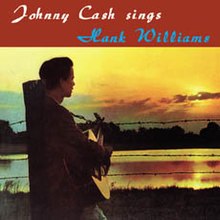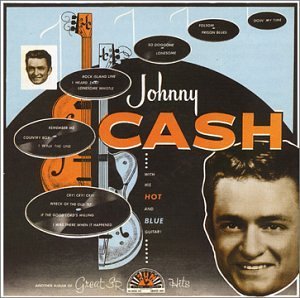
Johnny Cash with His Hot and Blue Guitar! is the debut studio album by American singer Johnny Cash, released on October 11, 1957. The album contained four of his hit singles: "I Walk the Line," "Cry! Cry! Cry!," "So Doggone Lonesome," and "Folsom Prison Blues." It was re-issued on July 23, 2002, as an expanded edition, under the label Varèse Vintage, containing five bonus tracks, three being alternate versions of tracks already on the original LP. In 2012, Columbia Records reissued the album with 16 additional non-album Sun Records tracks as part of its 63-disc Johnny Cash: The Complete Columbia Album Collection box set. In 2017, 60 years after the original release, the album was remastered under the title Johnny Cash with His Hot and Blue Guitar! . In 2022, Sun released a remastered edition of the original studio album, with only the original track listing. The songs had been remastered as to simulate being in the studio as the tracks were recorded.
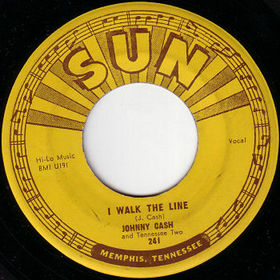
"I Walk the Line" is a song written and recorded in 1956 by Johnny Cash. After three attempts with moderate chart ratings, it became Cash's first #1 hit on the Billboard charts, eventually reaching #17 on the US pop charts.
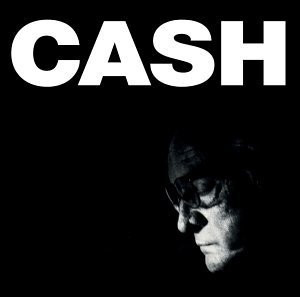
American IV: The Man Comes Around is the sixty-seventh and final studio album by Johnny Cash. It was released on November 5, 2002, by American Recordings and Universal Records. It is the fourth in Cash's "American" series of albums, and the last album released during his lifetime, and is considered some of his finest work towards the end of his life. The album was also included in the book 1001 Albums You Must Hear Before You Die.

Unchained, also known as American II: Unchained, is the second album in Johnny Cash's American Recordings series. It was released on November 5, 1996, by American Recordings. Like all of Cash's albums for American Recordings, Unchained was produced by Rick Rubin. The album received a Grammy for Best Country Album and Cash was nominated for Best Male Country Vocal Performance for his version of "Rusty Cage."
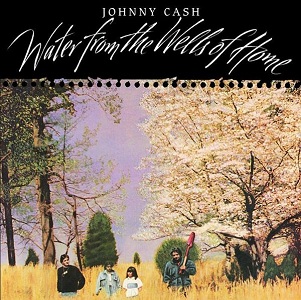
Water from the Wells of Home is the 75th album by American country singer Johnny Cash, released on Mercury Records in 1988. It features several collaborations with other artists, including "New Moon Over Jamaica" with Paul McCartney. Other guests include Waylon Jennings, Hank Williams Jr., Glen Campbell, Emmylou Harris and family members Rosanne Cash, John Carter Cash, June Carter Cash and members of the Carter Family. "Call Me the Breeze" is a J. J. Cale song that had been previously performed by Lynyrd Skynyrd. "Ballad of a Teenage Queen" is a new recording of a song that had appeared on Cash's Sun era album Sings the Songs That Made Him Famous. The album did not fare well on the charts, peaking at No. 48; the two singles, "Ballad of a Teenage Queen" and "That Old Wheel", reached No. 45 and No. 21, respectively. A 2003 re-release of the album contained a bonus track, consisting of Johnny Cash discussing various songs on the album.
Leon Roger Payne, "the Blind Balladeer", was an American country music singer and songwriter.

Lonely Street is the fifth studio album by American pop singer Andy Williams, released in late 1959 through Cadence Records. This, his fifth LP of new material for the label, is described by William Ruhlmann on AllMusic.com as "an album full of songs of lost love and loneliness that found Williams using more of the Mel Tormé-like foggy lower register of his voice." The liner notes on the back of the album jacket read, "The selections in Lonely Street, Andy confides, are those for which he feels a special affection. Every vocalist has a few personal favorites... and it is quite clear to the listener that this collection presents songs which Andy Williams believes, feels -- and loves."

"Kaw-Liga" is a country music song written by Hank Williams and Fred Rose.

"Big River" is a song written and originally recorded by Johnny Cash. Released as a single by Sun Records in 1958, it went as high as #4 on the Billboard country music charts and stayed on the charts for 14 weeks.
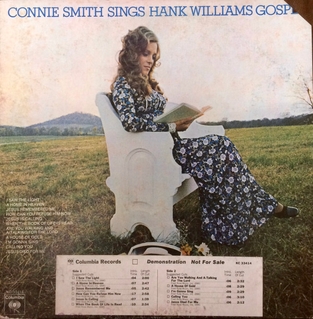
Connie Smith Sings Hank Williams Gospel is the twenty-fifth solo studio album by American country singer Connie Smith. It was released in May 1975 via Columbia Records and contained 11 tracks. The project was a tribute to Hank Williams and was considered the first tribute gospel album of his material. Smith had found over half of the album's material through previously-unreleased recordings. The album would make a brief chart appearance on the American Country LP's survey in 1975.
"Take These Chains from My Heart" is a song by Hank Williams. It was written by Fred Rose and Hy Heath and was recorded at Williams' final recording session on September 23, 1952, in Nashville. The song has been widely praised; Williams' biographer Colin Escott deems it "perhaps the best song [Rose] ever presented to Hank...It was one of the very few songs that sounded somewhat similar to a Hank Williams song." Williams is backed by Tommy Jackson (fiddle), Don Helms, Chet Atkins, Jack Shook, and Floyd "Lightnin'" Chance (bass). In the wake of Williams' death on New Year's Day, 1953, the song shot to No. 1, his final chart-topping hit for MGM Records. Like "Your Cheatin' Heart," the song's theme of despair, so vividly articulated by Williams' typically impassioned singing, reinforced the image of Hank as a tortured, mythic figure.
"You Win Again" is a 1952 song by Hank Williams. In style, the song is a blues ballad and deals with the singer's despair with his partner. The song has been widely covered, including versions by Ray Charles, Jerry Lee Lewis, Roy Orbison, the Grateful Dead, Charley Pride, Bob Dylan, and the Rolling Stones.
"I Love You Because" is a song written and recorded by country music singer and songwriter Leon Payne in 1949. The song has been covered by several artists throughout the years, including hit cover versions by Al Martino in 1963 and Jim Reeves in 1964.

Johnny Cash Sings the Songs That Made Him Famous is a compilation album by American singer-songwriter Johnny Cash, originally released on December 1, 1958 by Sun Records. The album is made up of songs Cash recorded for Sun prior to leaving the label for Columbia Records. The album was re-issued in 2003, under the label Varèse Sarabande, with four different versions of songs already available on the original LP as bonus tracks. The complete contents of the album are also incorporated into an extended version of the previous collection With His Hot and Blue Guitar included in the 2012 box set Johnny Cash: The Complete Columbia Album Collection.
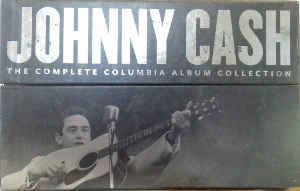
The Complete Columbia Album Collection is a box set by country singer Johnny Cash, released posthumously in 2012 on Columbia Records and Legacy Recordings.
"They'll Never Take Her Love from Me" is a country song popularized by Hank Williams in 1950. In 1961, Johnny Horton also had a hit with the song, and many others have covered it.
Exploito is a term generally given to describe cover version or sound-alike recordings that capitalize on the official recordings of artists. Typically they are of the budget release type of album. Often the buying public would think they are buying an album by the actual artist.
"Give My Love to Rose" is a country song by Johnny Cash, which he recorded together with the Tennessee Two at Sun Records under the production of Sam Phillips in 1957. The song was released in August of the same year as the B-side of the single "Home of the Blues", which reached No. 3 in the Country Jockey charts and No. 5 in the Country & Western Chart. "Give My Love To Rose" reached No. 13 in the Country & Western Chart.
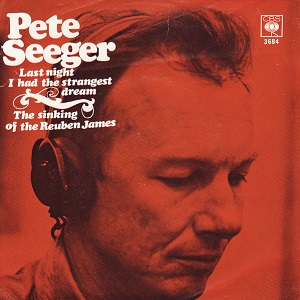
"Last Night I Had the Strangest Dream" is a song written by American folk singer-songwriter Ed McCurdy in 1950. Due to McCurdy's connection with fellow musicians, it was common in repertoires within the folk music community. The song had its first album release when Pete Seeger recorded it as "Strangest Dream" for his 1956 album Love Songs For Friends & Foes. Seeger would later re-visit the song for his 1967 album Waist Deep in the Big Muddy and other Love Songs. The strong anti-war theme of the song led it to be recorded by multiple other artists, including The Weavers (1960), Joan Baez (1962), The Kingston Trio (1963), Simon & Garfunkel (1964), and Johnny Cash who released two versions of the song during the 2000s.
